“Mind Calming Tablets for Dogs: Benefits, Dosage Chart, and Side Effects Explained”
In today’s busy, noise-filled, and unpredictable world, dogs are increasingly affected by stress, anxiety, and behavioral disorders. Whether it’s due to loud fireworks, separation from their owners, changes in environment, or visits to the vet, many dogs show signs of emotional distress. These signs often manifest as restlessness, barking, destructive chewing, or even aggression.
It supports emotional balance using a combination of natural herbs, amino acids, and essential nutrients that influence the nervous system. Its goal is to create a calmer, more manageable, and emotionally balanced dog without the side effects of pharmaceutical sedatives.
This blog will serve as your complete guide to Mind Calming 30 Tablets, covering:
- What Mind Calming Tablets are
- Their ingredients and how they work
- Indications and when to use them
- Dosage guidelines with tables
- Safety and side effects
- Comparisons with prescription medications
- Veterinary insights and real-world testimonials
What Are Mind Calming Tablets for Dogs?
Mind Calming Tablets are natural calming supplements formulated specifically for dogs. These tablets are designed to support the nervous system and reduce anxiety-induced behaviors without causing drowsiness or dependency.
They are manufactured using clinically studied herbal extracts and amino acids that influence neurotransmitter function, particularly those involved in calming and stabilizing mood, such as GABA, serotonin, and dopamine.
Product Highlights
- Form: Oral tablet
- Packaging: 30 tablets per bottle
- Target Species: Dogs of all sizes and breeds
- Purpose: Reduce stress, manage anxiety, support behavioral therapy
- Type: Over-the-counter nutraceutical supplement
Key Ingredients and Their Role
1. Passionflower Extract
Known for its gentle sedative effect, Passionflower supports calm behavior in anxious or hyperactive dogs. It helps alleviate restlessness and irritability.
2. Tryptophan
An essential amino acid that serves as a precursor to serotonin, the “feel-good” neurotransmitter. Increasing serotonin levels can reduce aggression and anxiety.
3. Magnesium
Essential for neuromuscular health and stress resistance.
- 4. Vitamin B6
This vitamin supports the metabolism of amino acids like tryptophan into active neurotransmitters. It plays a crucial role in emotional regulation.
Indications for Use
Mind Calming Tablets are indicated in dogs showing stress-related behavioral problems or conditions linked to emotional imbalance.
Common Indications Include:
- Separation Anxiety
- Fear of loud noises (thunderstorms, fireworks)
- Hyperactivity
- Travel stress (car rides, air travel)
- Aggression related to anxiety
- Vet visits and grooming anxiety
- Rescue or shelter dogs adapting to new homes
- Post-operative restlessness
In clinical and household settings, these tablets are often used alongside behavioral therapy or training programs to improve outcomes.
Signs Your Dog May Need a Calming Supplement
- Constant barking or howling when left alone
- Destructive behavior (chewing furniture, digging, scratching doors)
- Hiding, trembling, or urinating when exposed to noise or new situations
- Excessive licking or self-grooming
- Difficulty settling down or sleeping
- Unprovoked aggression toward people or animals
- Excessive panting or drooling in non-heat conditions
Dosage Guidelines
Correct dosing is crucial for the success of any supplement. Mind Calming Tablets are formulated with dosage flexibility, making them suitable for small breeds, large breeds, and everything in between.
Standard Daily Dosage
| Dog Weight (kg) |
Recommended Daily Dose |
Frequency | Administration Method |
| 1 – 5 kg | ½ tablet | Once daily | Crushed in food or given whole |
| 6 – 15 kg | 1 tablet | Once daily | Directly or with a treat |
| 16 – 30 kg | 1½ tablets | Once daily | Divide across meals if needed |
| 31 – 45 kg | 2 tablets | Once daily | Use food or pill pocket |
| Over 45 kg | 2½ tablets | Once daily | Split dose for better tolerance |
Note: For extremely anxious dogs or in acute stress episodes (e.g., fireworks night), the dose may be doubled safely for short periods under veterinary supervision.
How to Administer
- Can be given directly by hand, hidden in a treat, or crushed into food.
- Best administered 30–60 minutes prior to a known stressor, such as travel or thunderstorms.
- Works well with behavior training tools like clicker training or desensitization exercises.
Timing and Frequency
- Chronic Anxiety: For dogs with generalized anxiety, noise phobia, or reactivity, daily use is recommended—preferably at the same time each day to maintain stable levels.
- Situational Use: In cases like travel, grooming, fireworks, or thunderstorms, administer the tablet 30 to 60 minutes before the stressful event.
- Maximum Frequency: Do not exceed two doses in 24 hours unless specifically directed by a veterinarian.
Adjusting the Dose
Dogs respond individually to calming supplements. Over 7–10 days, you can evaluate whether your dog is calmer, less reactive, and more focused. If no improvement is seen by two weeks, a higher dose within the recommended range or complementary therapies (such as behavioral training) may be advised.
Monitor for any signs of over-sedation, such as excessive sleepiness, unsteady walking, or decreased alertness. If observed, reduce the dose or discontinue temporarily and consult your veterinarian.
Missed Doses and Overdose
- Missed Dose: If the next scheduled dose is due soon, skip the missed one—do not double dose.
- Overdose Response: Accidental ingestion of multiple tablets may cause symptoms such as vomiting, diarrhea, extreme drowsiness, or uncoordinated movement. In most cases, effects are temporary and non-life-threatening, but veterinary evaluation is strongly recommended for large overdoses, especially in small or elderly dogs.
Duration of Use
- Short-Term Use: For dogs with infrequent anxiety (such as during boarding, fireworks, or travel), Mind Calming Tablets can be given as needed, starting 30–60 minutes before the anticipated event.
- Long-Term Use: Dogs with chronic behavioral conditions may benefit from continuous, daily use. Many owners observe optimal results after 7–14 days of consistent administration.
There is no clinical evidence suggesting long-term harm from daily use, and unlike many pharmaceutical options, Mind Calming Tablets do not cause dependence or tolerance buildup. However, regular veterinary checkups are advised to reassess dosage and monitor any changes in behavior or health.
Special Considerations
- Senior Dogs: Older dogs with cognitive dysfunction or anxiety-related pacing and confusion may benefit from this supplement.
- Puppies: For dogs under 12 weeks, Mind Calming Tablets should only be used under veterinary supervision.
- Medical Conditions: Dogs with liver, kidney, or neurological disease should be evaluated by a vet before starting any calming supplement.
- Concurrent Therapies: Mind Calming Tablets may be used alongside behavioral training, pheromone therapy, or other natural calming aids. However, they should not be combined with prescription anxiolytics or antidepressants without veterinary approval, due to potential interaction risks (e.g., serotonin overload).
Veterinary Tip
For best results, use Mind Calming Tablets as part of an integrated behavioral support plan, including environmental enrichment, structured training, and positive reinforcement. Supplements work best when the dog’s daily routine supports their emotional stability.
How Long Does It Take to Work?
Mind Calming Tablets are non-sedative, so they don’t work instantly like a drug. However:
- Mild anxiety: Results may be noticeable within 3–5 days of daily use.
- Moderate to severe anxiety: Best results occur after 10–14 days of consistent administration.
- For long-term behavioral conditions, supplements should be given continuously for at least 4–6 weeks and evaluated periodically.
Wellness Impact and Safety Assessment
Mind Calming 30 Tablets are generally well tolerated with minimal risk of adverse effects.
Common (but uncommon) side effects may include:
- Mild digestive upset (nausea, loose stool)
- Drowsiness in sensitive dogs (usually subsides)
- Decreased appetite during first few days
These side effects are usually self-limiting. Most dogs tolerate the tablets well, even during long-term use.
Precautions:
- Not recommended for puppies under 12 weeks without veterinary guidance.
- Use cautiously in dogs already on prescription sedatives, SSRIs, or MAOIs.
- Not tested for use in pregnant or lactating females—consult your vet first.
Veterinary care should be sought if severe signs appear, though the risk is extremely low.
Mind Calming vs. Prescription Medications
| Feature | Mind Calming Tablets | Prescription Sedatives (e.g., Alprazolam) |
| Requires Rx | No | Yes |
| Sedation risk | Minimal | High |
| Dependency risk | None | Yes |
| Onset of effect | Gradual | Rapid (within 30 mins) |
| Long-term safety | Excellent | Caution required |
| Behavioral support | Yes | Mostly short-term relief |
Mind Calming Tablets are often used as a first-line or adjunct solution in mild to moderate behavioral cases and as part of a holistic anxiety management program.
Veterinary Insights
Veterinarians and canine behaviorists have increasingly incorporated natural calming supplements like these into fear-free handling protocols, pre-operative support, and behavior modification programs.
“In many dogs, the combination of L-theanine and herbal adaptogens significantly reduces stress-related behaviors. I often recommend Mind Calming Tablets as a safe first step before exploring medications.”
— Dr. Kavita R., Canine Behavioral Vet (Bangalore)
Real-Life Testimonials
Case 1: Bruno, 3-year-old Labrador Retriever
Bruno had severe car anxiety and would pant excessively during every ride. After two weeks of Mind Calming Tablets, he began entering the car calmly and even rested during drives.
Case 2: Choti, 2-year-old Indie mix
Rescued during lockdown, Choti showed signs of noise phobia and separation anxiety. Within 10 days of daily use, her nighttime barking stopped, and she began engaging positively with her environment.
Conclusion
Anxiety and stress-related behaviors in dogs are more common than ever—manifesting as hyperactivity, aggression, separation anxiety, and fear-driven responses to common stimuli like noise or travel. Left unaddressed, these behaviors can affect a dog’s quality of life, strain the human-animal bond, and even result in injury or destructive behavior. Mind Calming Tablets for Dogs offer a scientifically supported, non-sedative approach to managing canine anxiety using a blend of natural ingredients such as L-theanine, valerian root, and tryptophan. These components work together to promote emotional stability, reduce nervous tension, and support positive behavior—all without the drawbacks of pharmaceutical sedatives.







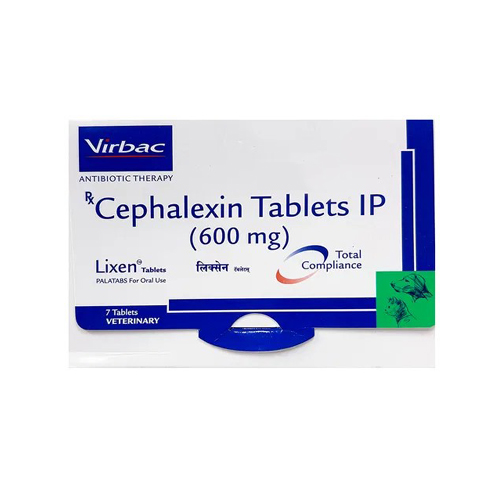
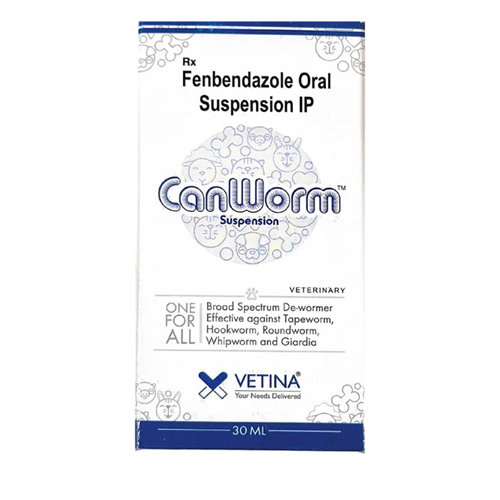



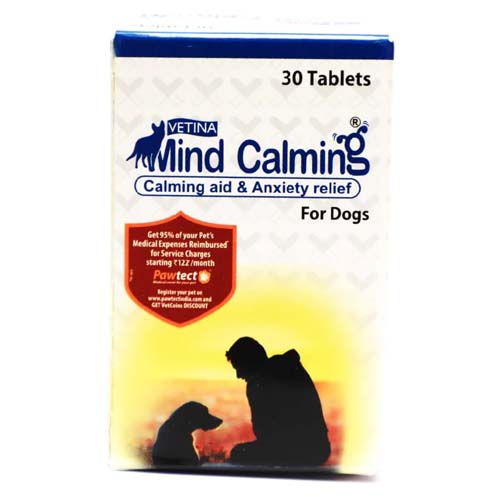
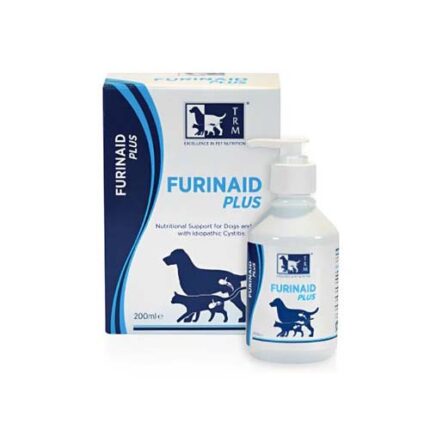
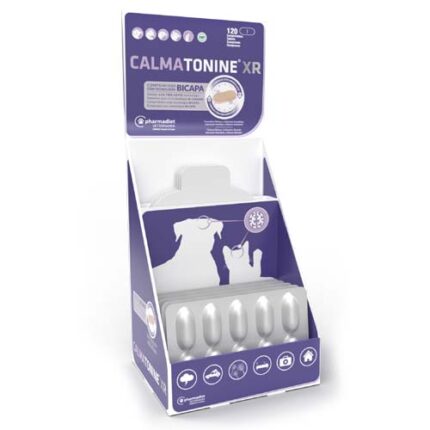
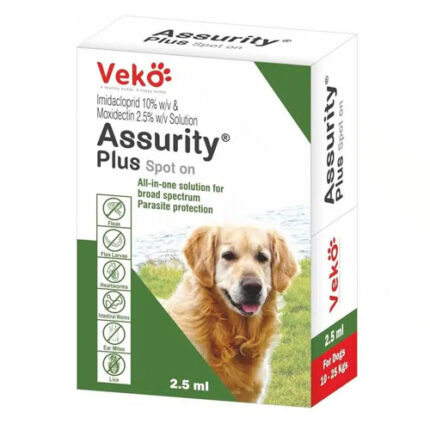


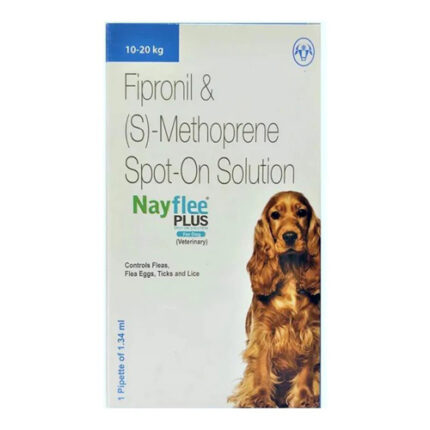
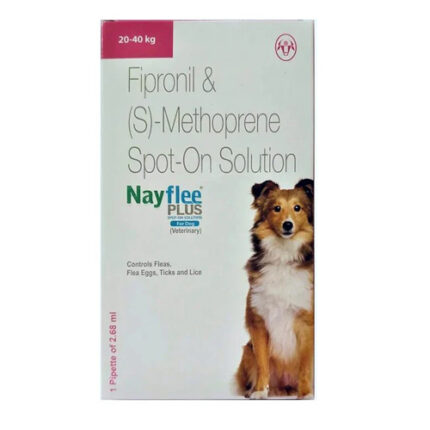

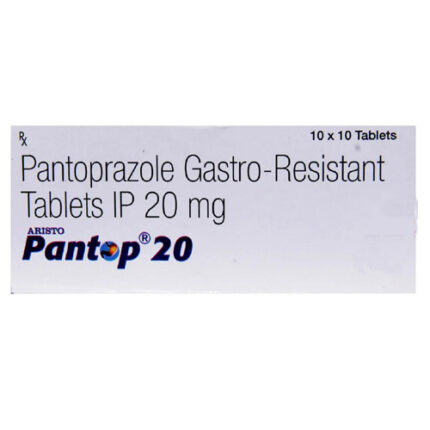
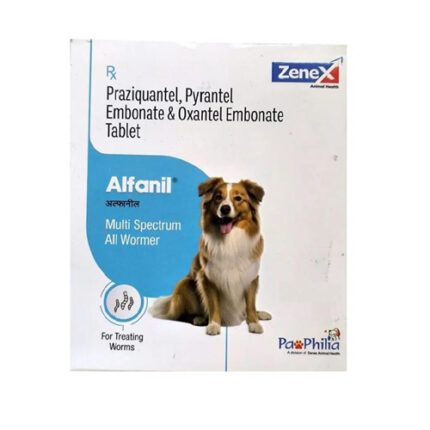
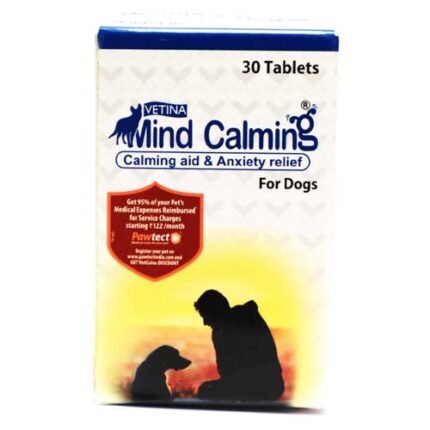
Reviews
There are no reviews yet.